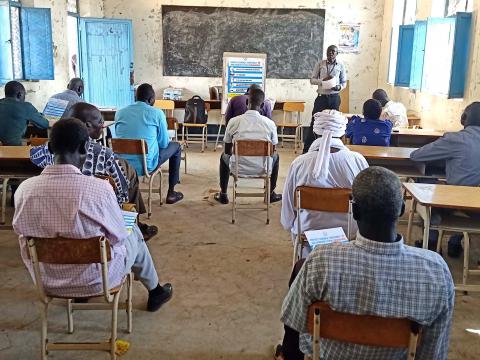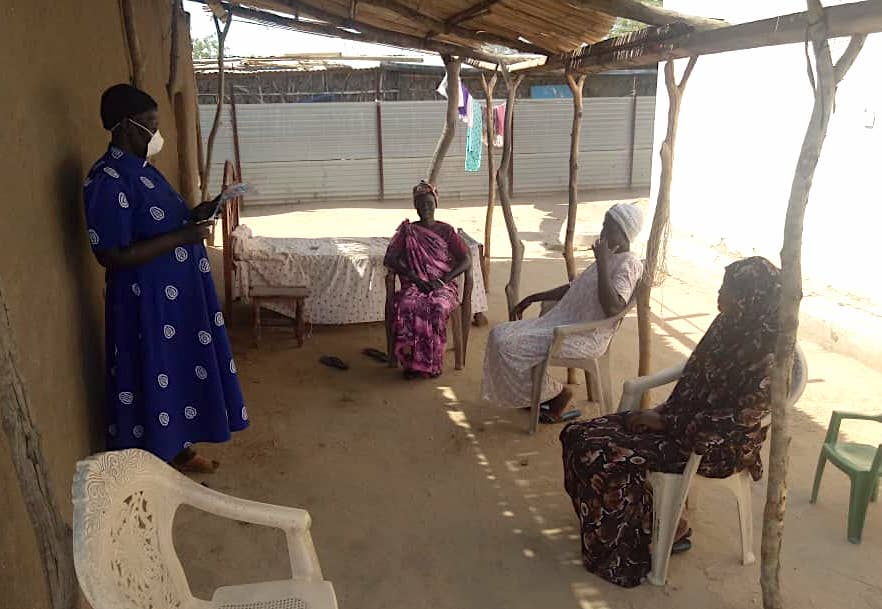420 South Sudanese faith leaders and World Vision partner on COVID-19 prevention campaign

The partnership with faith leaders from various churches and mosques in the country has boosted World Vision's campaign that has now reached over 1.4 million people.
Pastor Deborah Akon Wel, a 55-year old faith leader from South Sudan’s Melut County, echoed the sentiment and fear of many South Sudanese on the devastating impact of COVID-19 in the country. She said she is afraid many people could lose their lives knowing that the healthcare system is weak and does not have the capacity to handle the rising cases.
As of the last report this month, the South Sudan Public Health Laboratory has declared 1,307 confirmed cases. Pastor Deborah says, “My greatest fear is that COVID-19 has no known cure yet. Upper Nile State, just like the rest of the country, has no capacity to handle the cases that are rapidly increasing. We also get most of our food supply come from nearby Sudan and if the border completely close, the situation can turn to a disaster.”
Related story: COVID-19 case sparks fear in Juba's Protection of Civilians' site

As part of the prevention measures to stop the spread of COVID-19, South Sudan imposed the closure of public places such as churches and schools to discourage large gatherings. World Vision trained 420 faith leaders in the country coming from different churches and mosques on risk communications to assist in disseminating the prevention measures in the communities using radio talk shows and allowed community gatherings where social distancing can be observed.
Madeleine Bilonda, World Vision’s Operations Director, commended the faith leaders' support on World Vision’s COVID-19 response. She says, “The faith leaders are among the community gatekeepers. They are well-respected and trusted by the people in their own communities. When they talk to their church members, they listen because they believe in them. They can positively influence behavior change which is something very important at this time.”
The faith leaders are among the community gatekeepers. They are well-respected and trusted by the people in their own communities. When they talk to their church members, they listen because they believe in them.
“World Vision has done well in training us as faith leaders and it is now our responsibility to share the information and make sure people even in remote villages are aware to keep everyone safe and protected from the coronavirus, as well as stop its spread”, adds Pastor Deborah.
Another faith leader Daniel Yaak Mayen honestly confided he does not have enough knowledge of COVID-19 before he got trained by World Vision. “I only heard that there is a disease outbreak with malaria-like symptoms and has been killing thousands of people in other parts of the world. I learned a lot about how it affects people or can be prevented from the training”, Daniel shares.
Related story: Girls fear being forced to marry to save families from COVID-19

World Vision’s Faith and Development Advisor Angelo Matuch said involving the churches is critical and very strategic in the campaign. “There are a lot of misconceptions and wrong understanding of COVID-19 in rural communities. People believe their pastors will always act in their best interest so whatever information and knowledge they share will be respected and followed.”
Mathuch also emphasized that the different faith leaders coming from Christian churches and Muslim mosques have structures that can reach even the most remote communities in the country. He adds, “This is very helpful in World Vision’s campaign to reach out to the most marginalized.”
“Now I know how I can help prevent the spread of the virus and I will take lead in my own community to make sure that the right information is shared to the people”, Pastor Daniel adds. With the support of the faith leaders, volunteers, and partners, World Vision’s field teams reached 1.4 million people with COVID-19 awareness campaigns.
Related story: My strength comes from helping South Sudanese mothers

With story contributions and photos from Abraham Chol Lual, Capacity Building Officer and Scovia Faida Charles Duku, Communications Officer